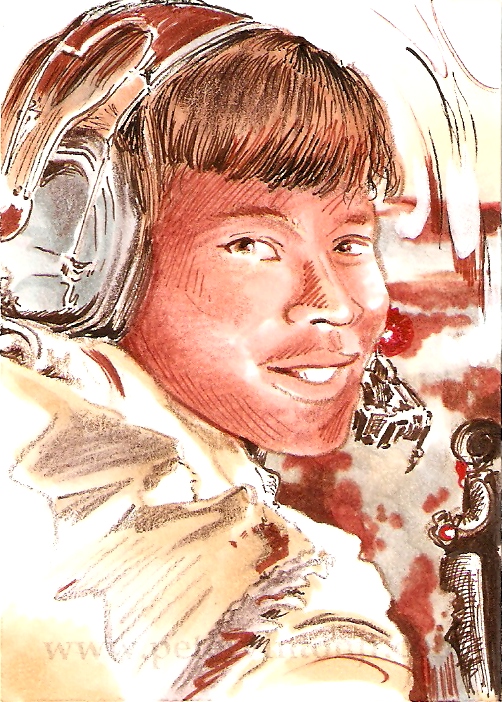An ongoing illustrative history study
This piece originally posted on 04/28/2025
as a courtesy to the United States Department Of Defense
Prelude | 181 | 182 | 183 | 184 | 185 | 186 | 187 | 188 | 189 | Email |
|---|
![]() "Being the only person who looked like me created challenges. A lot of it was very subtle. But you could just feel it --people looking at you and thinking, 'OK, she's here.' Some people still questioned if I was qualified to fly."
"Being the only person who looked like me created challenges. A lot of it was very subtle. But you could just feel it --people looking at you and thinking, 'OK, she's here.' Some people still questioned if I was qualified to fly."
 Everybody say hello to Capt. Theresa Mae Claiborne, the first Black woman pilot in the U.S. Air Force. Born in 1959 Virginia as a self-described "military brat" whose father was in the Armed Forces, Theresa graduated from Elk Grove High School and then from California State University college. While at college Theresa applied to ROTC in Berkeley, and during training she took the stick on a T-37 Cessna. "I decided right then," she states flatly, "I wanted to be a pilot." In 1980 the Air Force allotted 30 slots for women graduates, up from the previous 10, and Theresa embarked on her pilot training at Laughlin Air Force base in Texas. She describes it as a lonely period in her life, and besides the dual negatives of her race and her sex, she only stood at a height of 5'2" --the cutoff for pilots was at the time 5'4". But persevere she did, and on September 16, 1982 was commissioned as a second lieutenant.
Everybody say hello to Capt. Theresa Mae Claiborne, the first Black woman pilot in the U.S. Air Force. Born in 1959 Virginia as a self-described "military brat" whose father was in the Armed Forces, Theresa graduated from Elk Grove High School and then from California State University college. While at college Theresa applied to ROTC in Berkeley, and during training she took the stick on a T-37 Cessna. "I decided right then," she states flatly, "I wanted to be a pilot." In 1980 the Air Force allotted 30 slots for women graduates, up from the previous 10, and Theresa embarked on her pilot training at Laughlin Air Force base in Texas. She describes it as a lonely period in her life, and besides the dual negatives of her race and her sex, she only stood at a height of 5'2" --the cutoff for pilots was at the time 5'4". But persevere she did, and on September 16, 1982 was commissioned as a second lieutenant.
She generally flew a KC-135 Stratotanker while stationed at Loring AFB in Maine, and eventually attained the rank of Captain. In 1988 Theresa left active duty and joined the reserves as a flight commander and instructional pilot. In 1990, now-Lt. Col. Claiborne began working as a commercial pilot for United Airlines, flying Boeing 757s and 767s. A 30+ year career with United followed; she retired from the Air Force Reserves in 2003 but remained with United until just this past year (June 2024). Today she works as a mentor with organizations such as Women in Aviation and Sisters of the Skies (the latter of which she co-founded in 2015); advocacy programs designed to better inform women and girls that aviation is absolutely a viable career choice. Capt. Claiborne was inducted into the Organization of Black Aerospace Professionals Hall of Fame in 2017.
"I tell the young ladies I mentor the same thing I told myself: be so good that they can't say you're not good."
Consult the Wayback Machine for this misplaced biography:
https://web.archive.org/web/20241203190332/https://airandspace.si.edu/air-and-space-quarterly/issue-12/theresa-claiborne
Next lesson - Lesson 186: Dwayne Glenn McDuffie